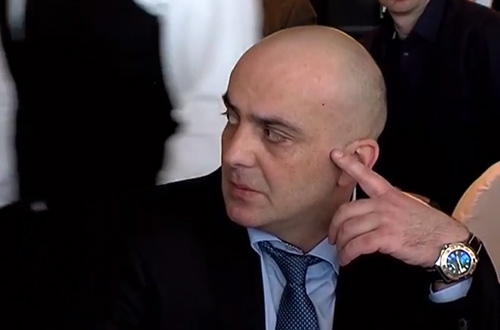
Georgia’s Discredited Chief Prosecutor Resigns—But Anti-UNM Prosecution Cases Multiply
Publication: Eurasia Daily Monitor Volume: 11 Issue: 2
By:

Georgia’s Prosecutor-in-Chief Otar Partskhaladze had to resign on December 30, 2013, following disclosures that, in 2001–2002, he had served a sentence of one year and three months in a prison in Augsburg, Germany, for robbery and resisting the German police (Rezonansi cited by Interpressnews, December 25; Civil Georgia, December 30, 2013). Initially, the Georgian Dream government strongly defended Partskhaladze. He was instrumental in the ongoing resurgence of investigations and prosecutions against members of the previous government, now the opposition United National Movement (UNM).
Prime Minister Irakli Gharibashvili had publicly nominated Partskhaladze for chief prosecutor on November 8, and then appointed him effective from November 21, 2013. The government’s comments on Partskhaladze’s resignation (see below) make clear that Gharibashvili had mandated Partskhaladze to step up proceedings against former and current UNM officials. This mandate would be consistent with Gharibashvili’s own threats to have UNM officials prosecuted, which he expressed as prime minister–designate during his confirmation hearing in parliament (see EDM, November 22, 2013).
Although politically-motivated investigations and prosecutions of opposition party officials are the most salient political issue in Georgia at this time, Partskhaladze did not appear in public for seven weeks after being officially nominated as chief prosecutor and did not take questions from journalists throughout his tenure (Civil Georgia, December 27).
The disclosures came from the UNM on December 23. Partskhaladze initially responded in a written statement that a German court had found him guilty only for a “verbal altercation” and “assaulting a police officer” during a “conflict in a public place.” Gharibashvili, in his turn, confirmed that Partskhaladze has a criminal record in Germany and had served a prison sentence in that country, but downplayed the “exaggerated noise” about this in Georgia (Rustavi-2 TV cited by Civil Georgia, December 24, 28; Rezonansi cited by Interpressnews, December 25).
Gharibashvili appointed Partskhaladze following Archil Kbilashvili’s resignation as prosecutor-in-chief. Comments by government officials reveal directly or indirectly that Partskhaladze had been tasked to re-energize proceedings against UNM officials—a policy labeled as a “restoration of justice” by the government. According to Gharibashvili, the UNM wants to discredit Partskhaladze because in just a few weeks in that post he had invigorated investigations against former government officials (Rustavi-2 TV cited by Civil Georgia, December 27, 30).
According to Deputy Prime Minister and Energy Minister Kakha Kaladze, the UNM is denigrating Chief Prosecutor Partskhaladze because his office has “started investigating cases over which questions have always been asked by the public” (Civil Georgia, December 24). According to Parliament Chairman Davit Usupashvili, Partskhaladze has been attacked unfairly because the authorities have started more actively to investigate former government (now opposition) officials (Maestro TV, December 26, cited by Civil Georgia, December 27).
For his part, Partskhaladze said in his two written statements that the UNM wants to denigrate the Chief Prosecutor’s Office “after it had stepped up investigations and filed charges against officials from the previous government,” and that he is resigning because “I do not want to cast a shadow on the political force [Georgian Dream] for which the restoration of justice is a priority” (Civil Georgia, December 24, 30).
Statements by top government officials openly reflect a politically motivated misuse of law enforcement institutions. Initially, government officials from Gharibashvili on down claimed that the prison sentence in Germany did not disqualify Partskhaladze from the post of chief prosecutor in Georgia. Thus, Internal Affairs Minister Alexander Tchikaidze characterized Partskhaladze as a “patriot and good professional who will successfully continue his activities.” The corrections minister (in charge of the penitentiary system), Sozar Subari, dismissed the incident in Germany as mere “gossips.” Georgian Dream parliamentary majority leader Davit Saganelidze declared that “even if [the sentence in Germany] is real, it happened long ago and it does not disqualify him.” And Speaker Usupashvili found “no reason [for Gharibashvili] not to appoint” Partskhaladze, and that “dismissing him now would be inappropriate” (Civil Georgia, December 24, 30; Maestro TV, December 26, cited by Civil Georgia, December 27).
The government’s initial reaction indicated its reluctance to part with a reliable executant of instructions for political misuse of law enforcement. Ultimately, Gharibashvili officially accepted (possibly also unofficially inspiring) Partskhaladze’s resignation only because, according to the prime minister, “this episode may somehow cast a shadow on the process of restoration of justice” (Civil Georgia, December 30). Thus the decision turned out to be based on political expediency, rather than due process or rule of law. Meanwhile a new wave of prosecutions against UNM officials, as publicly heralded by Gharibashvili when taking over as prime minister, is gathering force.




